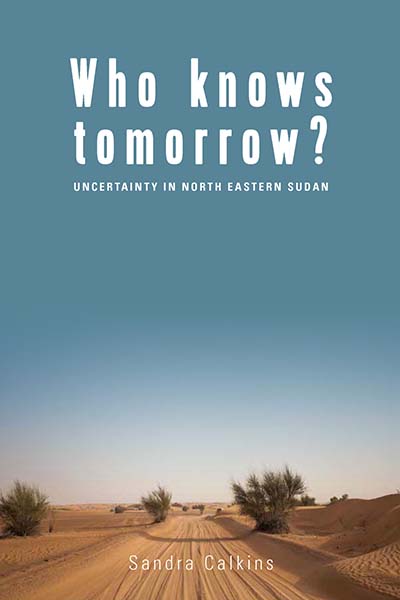“… [The text] is distinctly original in the way the research was carried out, and in its focus on the experience of uncertainty: not an easy thing to do and quite a challenge to social anthropology.” • Journal of the Royal Anthropological Institute
(JRAI)
“Calkins’s Who Knows Tomorrow? is a refreshingly unconventional exploration of living with uncertainty in Sudan… while richly grounded in the ethnography and history of Sudan, the book compellingly rises to the level of an existential predicament that all people share… the book will interest those looking for fresh approaches that complement more familiar concerns in the study of African worlds.” • African Studies Quarterly
“Taking French pragmatic sociology as point of departure for her analysis, Calkins comes very near the actual experiences of individual actors. Her emphasis on uncertainty about the future (including the outcome of fieldwork) and the way people deal with it through accepting, modifying or rejecting established forms (of which this book is an outstanding example) is – in any case for me – a welcome enlargement of our understanding of human behaviour.” • Social Anthropology
“…a thought-provoking text for all preoccupied by theoretical, philosophical, and development-related issues regarding lived unpredictability and how its culturally diverse configurations could be translated into ‘uncertainty’.” • Anthropos
“The book is a rich ethnographic and theoretical contribution to the anthropology not only of uncertainty but of the future, which is after all where much of our uncertainty lies. It substantiates the point that ‘culture’ and ‘institutions’ are not completed and stabilized products of the past but are ongoing accomplishments of the present, oriented to circumstances of imperfect knowledge, contested interests and perspectives, and open horizons." • Anthropology Review Database
“This book is a sophisticated, compelling, and innovative piece of work… The analysis of forms in dealing with uncertainty is a major contribution… In exploring how people in Sudan mobilize and reflect upon these forms, [Calkins] creates a novel kind of ethnography… Fluent, intriguing, and intelligent.” • Susan Reynolds Whyte, Department of Anthropology, Copenhagen University
“Calkins has elegantly written an unconventional ethnography that presents new perspectives on issues of marginalization, poverty and hunger. This is a must read for everyone concerned with Sudan and the fundamental uncertainty of human existence.” • Musa Adam Abdul-Jalil, Department of Sociology and Social Anthropology, University of Khartoum
Although uncertainty is intertwined with all human activity, plans, and aspirations, it is experienced differently: at times it is obsessed over and at times it is ignored. This ethnography shows how Rashaida in north-eastern Sudan deal with unknowns from day-to-day unpredictability to life-threatening dangers. It argues that the amplification of uncertainty in some cases and its extenuation in others can be better understood by focusing on forms that can either hold the world together or invite doubt. Uncertainty, then, need not be seen solely as a debilitating problem, but also as an opportunity to create other futures.
Sandra Calkins is assistant professor for anthropology at the Free University of Berlin and a member of the Law, Organization, Science, and Technology group at the University of Halle. She has conducted research in Sudan and Uganda and published on questions of existential uncertainty, reflexivity, health and nutrition. In 2016, she won the young scholar award of the African Studies Association in Germany (VAD) African Studies Association in Germany (VAD).
BL: DRT ELD.DS.152274
BISAC: SOC002010 SOCIAL SCIENCE/Anthropology/Cultural & Social; SOC042000 SOCIAL SCIENCE/Developing Countries
BIC: JHMC Social & cultural anthropology, ethnography; GTF Development studies


